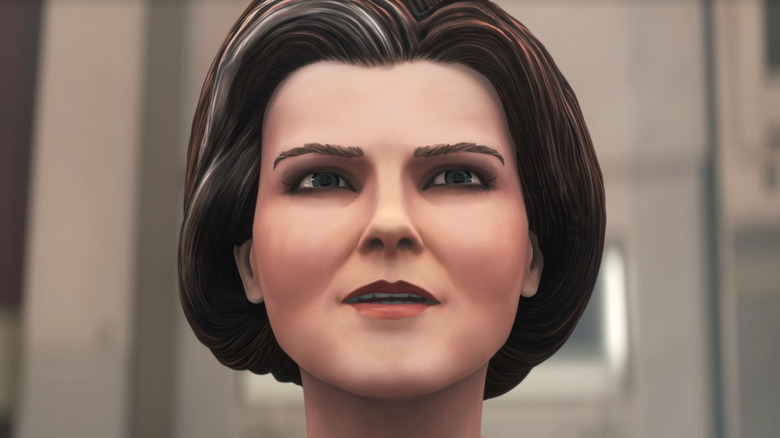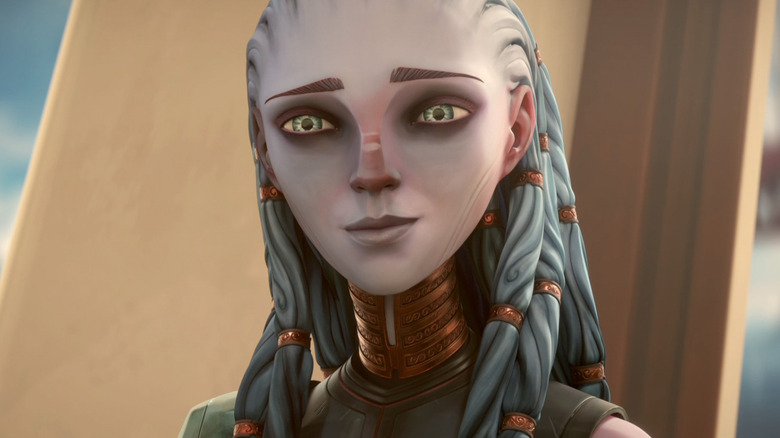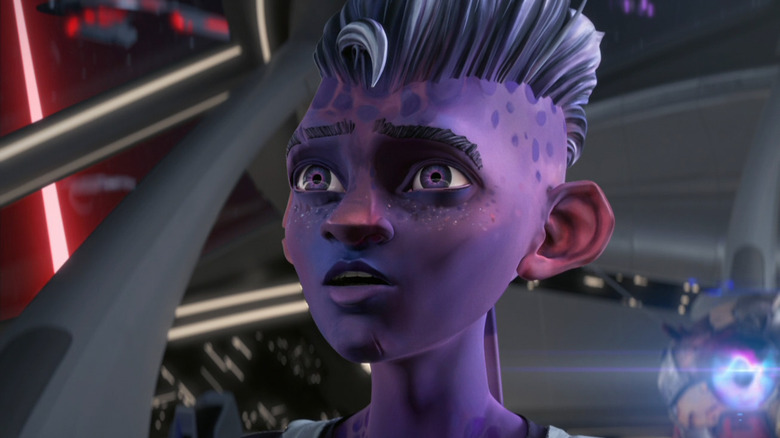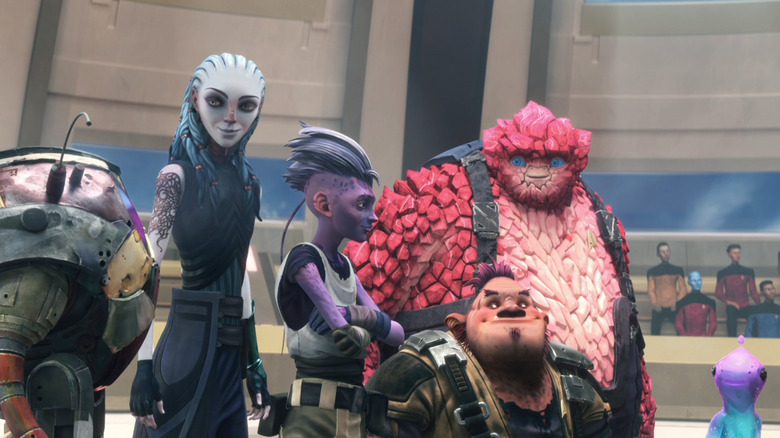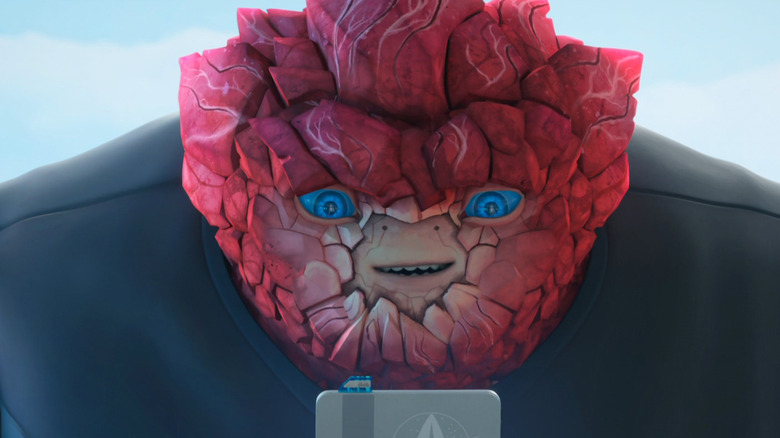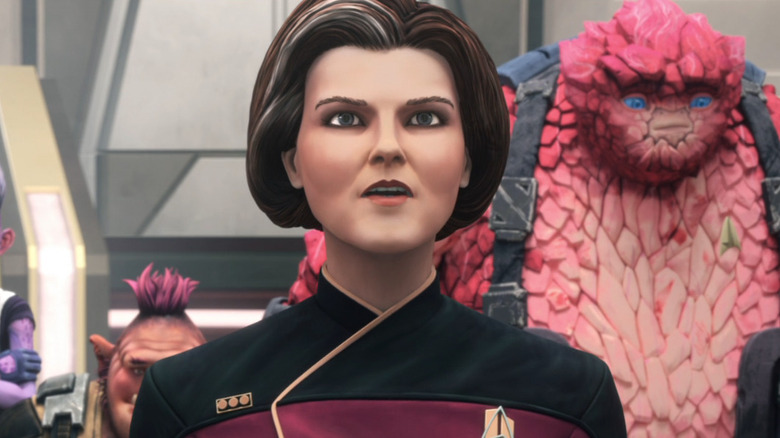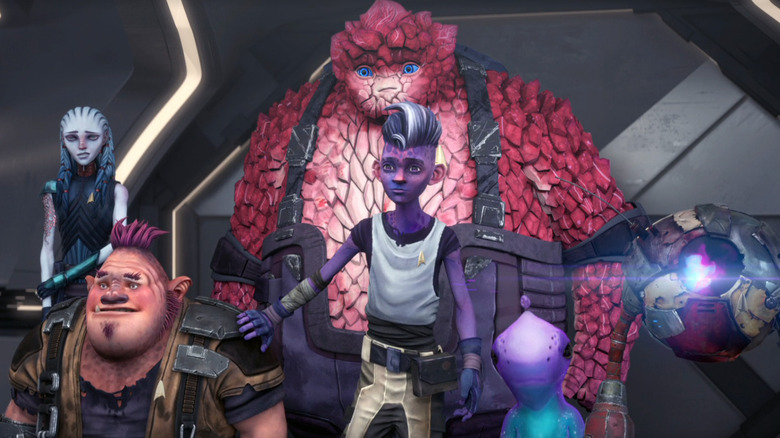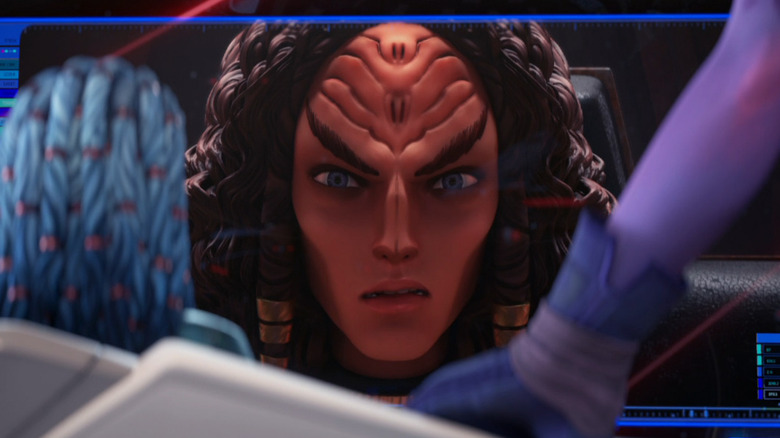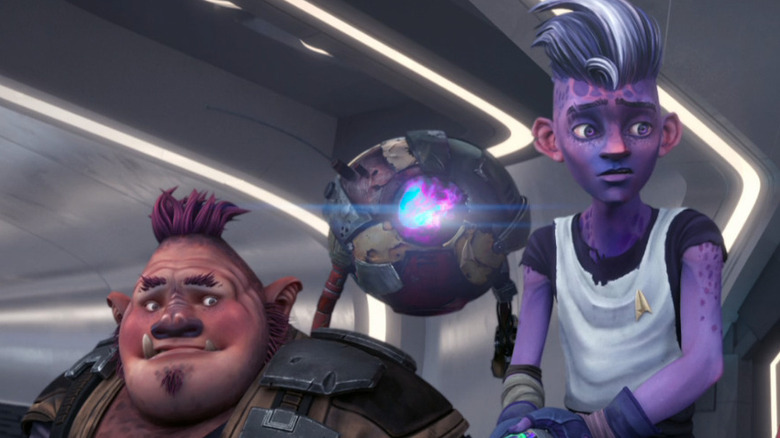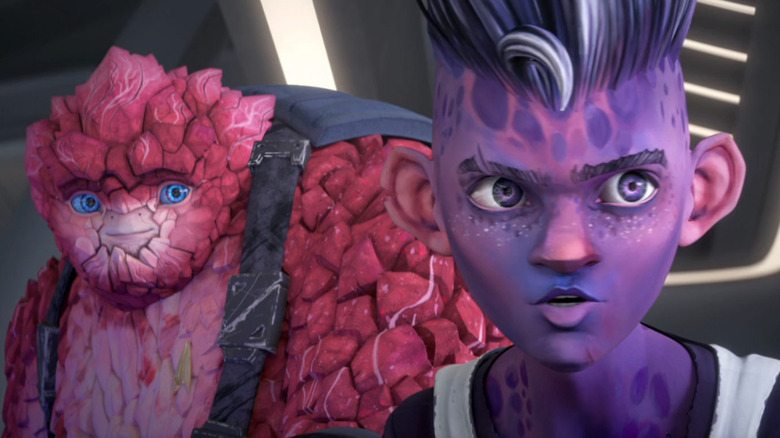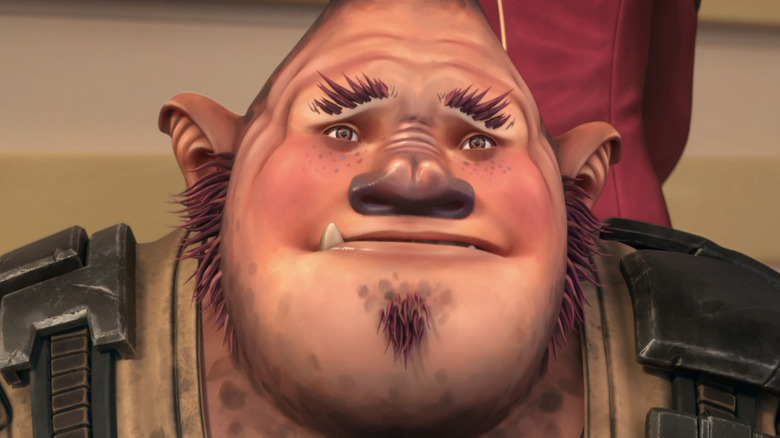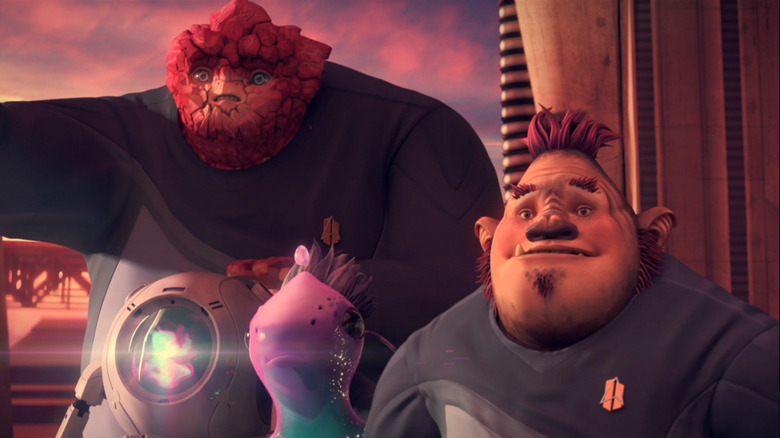The Ending Of Star Trek: Prodigy Season 1 Explained
The longest season in the franchise since "Enterprise" went off the air in 2005, the debut of "Star Trek: Prodigy" included 20 episodes split into two parts, aired in 2021 and 2022. The series introduced fans to an all-new cast of kid characters, a collection of misfits from across the galaxy who band together to stop the villainous Diviner. Aboard an unearthed and abandoned Starfleet vessel, the USS Protostar, the crew escapes the planet Tars Lamora. With the help of a holographic assistant patterned after "Voyager" captain Kathryn Janeway (voiced by a returning Kate Mulgrew), they set a course for the Federation with dreams of joining Starfleet themselves.
The ragtag crew of the USS Protostar discovers that their ship has been turned into a deadly weapon capable of obliterating the Federation, and suddenly finds themselves on the run from the real Admiral Janeway. In the two-part season finale, "Supernova," the USS Protostar and its child crew face down an armada of Starfleet ships. They must prevent the Protostar from activating The Living Construct — the unstoppable weapon hidden aboard that could put an end to the United Federation of Planets forever.
Led by Dal R'El, the USS Protostar will not only save the day, though. Its crew members learn new lessons and chart their own paths to the future. A surprising hit that proved as entertaining for adult Trekkies as it did for kids, "Star Trek: Prodigy" Season 1 had an excellent ending that we're here to explain.
A road to redemption
The crew of the USS Protostar is led by Dal R'El, a misfit boy who is eventually revealed to be the product of experimentation using prohibited genetic augmentation. Beside him is Rok-Tahk, a hulking rock creature with a gentle soul and a love of the sciences; a crafty Tellarite engineer named Jankom Pog; a Medusan named Zero; and Mellanoid slime worm Murf. They were all once the prisoners of the evil Diviner, held as laborers on the planet Tars Lamora through no fault of their own.
There is also Gwyndala, the daughter of the Diviner, a man who has time traveled into the past after the Federation caused the destruction of his world. Throughout the series' first season, Gwyn has struggled not just to find her place and purpose, but also to redeem herself for her people's crimes and her father's cruelty. While few have held her responsible for the Diviner's quest to destroy the Federation, Gwyn has carried her guilt as a heavy burden.
In "Supernova," Gwyn may have finally found her redemption after she helps the Protostar crew end the threat to Starfleet, though it comes at the cost of her father's life. At the conclusion, Gwyn is the only member of the crew not to join Admiral Janeway. Instead, she chooses to head to her home world, where she hopes to change her people's future and atone for the monstrous crimes of her time-traveling father the Diviner. She also takes on the fitting moniker of The Unifier.
Don't judge a book by its cover
Despite being enjoyed by adults almost as much as by the kids it was designed for, "Star Trek: Prodigy" still follows more or less the same familiar pattern of many shows for children. This means it includes moral messages and life lessons we've all seen many times before, like never judging a book by its cover. Thankfully, the time-honored adage here gets a decidedly "Star Trek" twist.
As the series began, the Diviner and his allies were quick to judge the escaped laborers from Tars Lamora as little more than misfit miscreants. They underestimated not only their abilities but also their strength of character, moral conviction, and heart. In fact, even when they come to the attention of Admiral Janeway — who sees them as criminals who've apparently stolen a Starfleet ship — she, too, misjudges them. It's not until she gets a taste of their fight with the Diviner in the episode "Mindwalk" that she comes to realize how wrong she was about them.
The biggest miscalculation is a deeply personal one: throughout the season, we've seen Dal as a lost, wayward son of an unknown people. When we learn that he is actually the genetically modified augment, he's quick to dismiss himself as a mistake of science. By the finale, Dal embraces his inner hero and becomes the leader he was destined to be.
Finding a family
There is perhaps no greater theme in Season 1 of "Star Trek: Prodigy" than finding one's chosen family. The entire crew of the USS Protostar, from big Rok-Tahk to little Murf, are all outcasts, misfits, and pariahs — lost souls with no home and no family, all looking for a place to belong. They all lament no longer having a home to call their own, but eventually find it among each other.
All crew members start in the same location on their journey at Tars Lamora, but each has a unique struggle. Zero the Medusan stands out among their people for their curiosity and thirst for discovery. Jankom is an orphaned Tellarite who was forced to leave his people to save his entire ship when he was young. Rok-Tahk is a wandering Brikar once forced to fight in gladiatorial arenas for the amusement of others and abandoned when she no longer met the whims of her captors. Dal of course had no family, and no people either, with no knowledge of where he came from. And Murf? Well, Murf is Murf.
Gwyn too needs to find a new home after refusing to take part in her father's villainous schemes. Despite starting out distrustful of one another, they all come together to work as a team.
Discovering your purpose
Throughout the first season of "Star Trek: Prodigy," the crew of the USS Protostar was lost, with no place in the galaxy to call home. As listless youngsters, they were devoid of the mentorship needed to help point them to their future, lacking role models or parental figures to guide them toward adulthood and a life with meaning and purpose. Over the course of the story, each member of the crew slowly discovers just where they're meant to be, with a purpose to push them to greatness. This begins when they learn about the Federation and Starfleet.
Upon discovering what Starfleet is all about, they become enamored with what it represents. It becomes not just their destination, but also their collective ambition. They also each find an individual purpose. The mistrustful, cynical Dal discovers his true gifts as a natural leader, Jankom realizes he truly is a gifted engineer, and Zero finally finds self-acceptance.
Despite hailing from a people out to destroy the Federation, even Gwyndala embraced a role as a pillar of change. Rok-Tahk meanwhile became confident and discovered her love of science. Her journey from sad, lonely, outcast to self-assured science officer may have been one of the most satisfying arcs of the season. In the end, she chooses to become a xenobiologist. With a new purpose and direction, the entire cast grows out of their misfit status and is on their way to becoming true heroes.
Paradise isn't perfect
Since "Star Trek" was first introduced in the 1960s, one of the foundations of the franchise was a future paradisiacal civilization. Starfleet, the United Federation of Planets, and Earth itself were often portrayed as aspirational utopias that offered a glimpse of a future that we could make real if we in the present worked hard enough to achieve it. Though there have been a handful of episodes — particularly in "Deep Space Nine" and "Picard" — that challenged the notion that Earth and the future we see in "Star Trek" was perfect, the failings of the Federation are a theme explored here in "Star Trek: Prodigy," too.
The heart of the series' conflict with the Diviner rests on a future first contact mission to an alien world called Vau N'Akat that had disastrous consequences. Over time, a schism among its people led to a civil war that nearly destroyed the entire world. The people blamed the Federation, who recklessly made contact with no thought to its ramifications, prompting the Diviner to return back in time to prevent his people from ever meeting the Federation by destroying them.
In the end, this foible in the Federation is never quite resolved, but the message is clear: nobody and nothing is ever truly perfect, and we can always strive to do better. Despite our shortcomings, we must never waver. We must fight for those who need help the most, and shouldn't shy away because we might make mistakes.
The power of friendship
In "Star Trek," a common theme across many of the show's best episodes is the magic that can be accomplished with the combined efforts of a starship crew. From the strength and commanding presence of a ship's captain (in concert with his faithful first officer, tireless chief engineer, valiant security chief, dedicated medical officer, and skilled helmsperson) down to the efforts of the lowest-ranked ensigns, there's not much they can't do. Never has this message been so prominent as in Season 1 of "Star Trek: Prodigy."
Over the course of the season, we saw Dal, Rok, Gwyn, and the others reluctantly join forces, over time becoming the most valued and trusted of friends. Though it took time for them to form bonds of friendship, it's only because of their camaraderie that they're able to achieve victory. Thanks to that friendship, the efforts of every once-outcast crew member culminate in a victory over evil in the final two-part episode "Supernova."
That they all started out from such low places, joined forces, struggled through adversity, and grew into a faithful fellowship makes it all the more incredible. Their final defeat of the Diviner's plan and the Living Construct is a cheer-worthy triumph, driving home just what can be accomplished through the power of friendship.
Even bitter enemies can become friends
If friendship was a central concept in the first season of "Star Trek: Discovery," a secondary message has been how new friends can come from unexpected places. We see elements of this message over the course of the season, with a final iteration in the last installment.
In "Supernova, Part 1," when the USS Protostar's weapon is unleashed and wreaking havoc on the Federation fleet, Gwyn sends out a distress call to Starfleet's allies, summoning a veritable armada of friendly vessels. The first ship to answer the call is a Klingon Bird of Prey. We don't think it was any coincidence that the writers made the decision to highlight the warrior race as an ally to the Protostar.
Famously one of the Federation's greatest foes during the era of the original "Star Trek," the more recent series "Discovery" has shown just how vicious they were in the war with Starfleet. In the decades since, the Klingons became valuable allies, with the USS Enterprise even boasting a Klingon security officer, Lt. Worf. This proves that even the bitterest enemies are capable of putting aside their differences to become friends. Could this be foreshadowing the villainous Vau N'Akat eventually becoming a member of the Federation? We think it's a strong possibility.
Anyone can be a hero
Across more than 50 years of stories from a dozen TV shows and even more movies, Trekkies have seen the best that Starfleet has to offer. The gung-ho Captain Kirk, the wise Picard, the unflappable Sisko: all lead crews that represent the finest officers in the Federation's fleet. Though the more comedic "Star Trek: Lower Decks" has more recently delved into the adventures of lower-ranked officers in Starfleet, "Star Trek: Prodigy" shows us that heroes don't have to be Starfleet's greatest captains or even highly skilled officers of any kind.
With a combination of courage, ingenuity, sheer determination, and plenty of spirit, the kid crew of the USS Protostar proved that heroes come in all shapes and sizes. One doesn't have to be a mighty Klingon Warrior to defeat the most deadly enemy or the most decorated starship captain to lead a crew into battle against an implacable foe. In the finale "Supernova," Dal, Gwyn, Jankom, and the rest show us that being a hero isn't about training; it's about heart, resolve, and sacrifice.
In the closing moments of the finale, Dal and his crew are brought before the Federation Council. While the leaders there are ready to punish them for stealing the Protostar and impersonating Starfleet officers (among other charges), Admiral Janeway comes to their defense to remind everyone that despite how they may appear, they saved the Federation and are heroes all the same.
Believing in yourself
If "Star Trek: Prodigy" teaches us anything about how to actually be a hero in the conclusion to its first season, it's the incredible empowering force of belief in oneself. When the cast of characters was introduced at the start of the season, Dal, Rok-Tahk, and Zero all doubted their own abilities and feared having to take action in crucial moments with big consequences.
As the story unfolded, each of them uncovered the strength within, learning to trust themselves when it mattered most. For example, with holo-Janeway's help, Rok-Tahk finally overcame his fear of conflict, and Jankom realized that his engineering prowess really could make a difference and that he really was a miracle worker. Most of all, Dal slowly came around to become a confident commander. In the finale, his crew faithfully follows him into battle, taking his orders without question — a far cry from the beginning of the season, when he was barely able to give a command and they weren't exactly eager to follow him.
In "Star Trek: Prodigy," the power of belief is front and center. Have faith, have courage, have strength, and just about anything is possible — even defeating an interstellar time-traveling tyrant.
Flaws can be a source of strength
At one time or another, we've all felt that our flaws are holding us back from greatness. In "Star Trek: Prodigy," Dal, Gwyn, and the crew of the USS Protostar understand this feeling all too well. Each of them — rightly or wrongly — feels they are inadequate in some way, whether it's Zero's dangerous true form (which can kill on sight), Gwyn's ancestry, or Dal's genetic makeup. By the time the finale of the season has rolled around, it's clear to each and every one of them that what they may perceive as a failing can actually be a source of incredible strength.
For Dal, he fears that his genetic augmentation makes him little more than a lab experiment and unworthy of Starfleet. But in "Supernova," Janeway makes the point that by being made up of traits from Federation members like the Vulcans, humans, Tellarites, and more, he is a literal embodiment of the United Federation of Planets and the strength in unity that it stands for. For the USS Protostar crew, it all comes down to your point of view: you can either allow yourself to be dragged down by your flaws or use them as motivation to rise beyond your limitations. At the end of the day, our limits are often self-imposed. Nowhere is that truer than in Season 1 of "Star Trek: Prodigy."
The future is bright
"Star Trek Prodigy" did a lot more storytelling in its first season than many fans may have expected. More than just a children's adventure, the series has opened up new avenues for the wider "Trek" universe and continued the stories of longtime fan-favorite characters like Janeway, who returned after a 20-year absence. The finale "Supernova" doesn't resolve the search for her former first officer Chakotay — who went missing on a deep space journey — but does provide a nice teaser that should continue the storyline into Season 2, with the establishment of a wormhole that could lead directly to him.
As for the USS Protostar, the ship is destroyed to save the Federation during the second half of the season finale, but don't fret: In true "Star Trek" tradition, there's already a replacement unveiled and ready to launch. In the finale's final closing moments, Admiral Janeway reveals that Starfleet has just approved a new class of Protostar Class starships. Whether Dal, Jankom, Zero, Murf, and Rok-Tahk will serve aboard one isn't revealed — in fact, it's hinted that they may be set for something even bigger — but we do know that Admiral Janeway will join them as their new commanding officer. Though the kids weren't accepted into Starfleet Academy, they were made warrant officers in training and will embark on a new, still-unrevealed journey.
